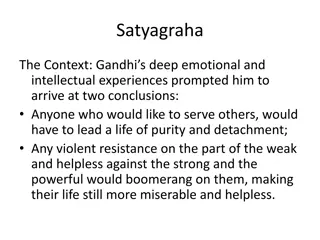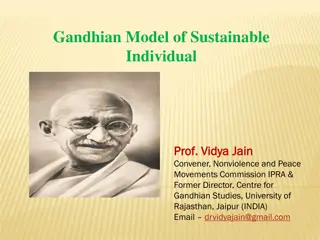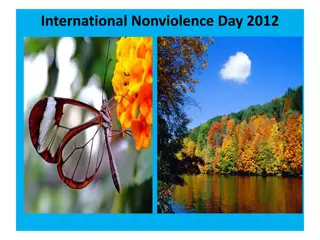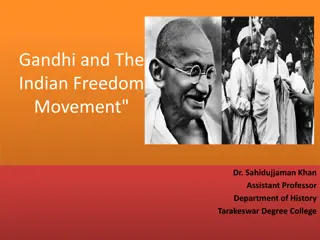Understanding Satyagraha: Gandhi's Nonviolent Resistance
Gandhi's concept of Satyagraha emphasized truth and nonviolence, leading to passive resistance against injustice. Rooted in purity and detachment, Satyagraha uplifts both the oppressed and oppressors, offering a dynamic and powerful means to confront evil without bitterness or revenge.
0 views • 6 slides
Gandhian Model of Sustainable Individual Behavior in the Globalized World
The Gandhian model of sustainable individual behavior, as advocated by Prof. Vidya Jain, emphasizes nonviolence, peace, and harmony in a world plagued by globalization, conflicts, and intolerance. Drawing on Gandhi's principles from Hind Swaraj, the paper explores how fostering nonviolent societies
0 views • 30 slides
Understanding Nonviolence - Embracing Love and Justice
Nonviolence transcends mere avoidance of harm by fostering a state of love, seeking good for all, including wrongdoers. It advocates active pursuit of peace and justice through compassion, respecting others as ourselves. Despite challenges, it has historically proven effective in bringing about posi
0 views • 27 slides
Mahatma Gandhi and the Indian Freedom Movement
Mohandas Karamchand Gandhi, also known as Mahatma Gandhi, played a pivotal role in India's freedom movement with his philosophy of nonviolence and civil disobedience. Born in 1869 in Porbandar, Gujarat, Gandhi's experiences in South Africa and return to India in 1915 shaped his activism. He led move
0 views • 11 slides
A Green New Deal for Maryland: The Path to a Sustainable Future
Explore the framework for a Green New Deal in Maryland, focusing on grassroots democracy, social and racial justice, nonviolence, and ecological wisdom. It addresses the challenges posed by fossil fuel-powered parties and outlines a vision for a more equitable and sustainable future in the state.
0 views • 10 slides




